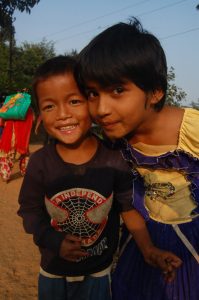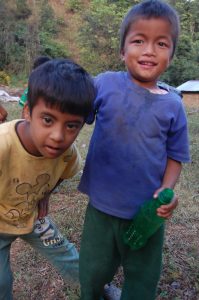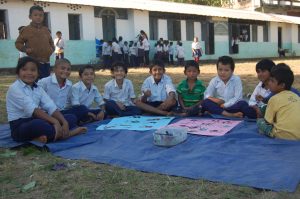Can you imagine growing up in one room with eleven other kids? Spending 24 hours every day with each other, sharing a bed, and looking out for each other? Every day, I spend time with my province’s students  with disabilities, who are based at my school. There are twelve students that live full-time in a classroom at the school, and I have a blast. They could one day write a book about what it was like growing up living in close quarters with eleven other rambunctious little kids.
with disabilities, who are based at my school. There are twelve students that live full-time in a classroom at the school, and I have a blast. They could one day write a book about what it was like growing up living in close quarters with eleven other rambunctious little kids.
Saturday starts off with a visit to the public tap. It’s incredibly cold, and showering in the glacier-runoff water isn’t pleasant at all. It’s the oldest kids’ responsibility to bathe the younger ones. They have a system down. The older ones line up as a bit of an assembly line: one strips the child, the next one forces him under the water, the next one adds soap, until the process is complete.
The issue is as soon as younger children out the water is freezing cold, they pull some spider-man-like acrobatics trying to getting away. I’ve seen some truly incredible gymnastics take place at the tap on Saturday mornings. The other remarkable thing is that the little kids don’t realize the water is incredibly unpleasant until it’s their turn. They all stand there expressionless as they watch the first victims fight the water. Then, when it’s their head being forced under the tap, all hell breaks loose. After their showers, they aren’t allowed to put on their dirty clothes again, so there’s just this line of dejected naked kids walking single-file the half mile to the school.
After they dress in clean clothes, one of their “house mothers” gives them a lecture about how they should sit quietly and not dirty their clothes. As soon as she releases them from her finger-pointing tirade, the kids immediately run outside to the biggest piles of dirt they can find. I’ve never seen clean clothes last longer than three minutes.
There’s always something going on. Those kids are never bored. One afternoon I came in to find that they had decided they hated a certain tree, so they spent a solid hour trying to pull it down. It was quite the group effort, but in the end, the tree won. It’s still standing, even though a few kids have scratches and bruises as a result of their run-in. Here’s a video I took of that:
They also hate all monkeys with a vengeance. If anyone sees a monkey anywhere in the village (and there’s a lot of them), the ki ds immediately arm themselves with handfuls of stones and chase after them. I’ve seen them spend hours throwing stones into trees long after the monkeys have scuttled away. I keep telling them one day the monkeys are going to stage a coup. They spend the rest of the day talking about those monkeys, retelling the tales of their stone-throwing escapades over dinner.
ds immediately arm themselves with handfuls of stones and chase after them. I’ve seen them spend hours throwing stones into trees long after the monkeys have scuttled away. I keep telling them one day the monkeys are going to stage a coup. They spend the rest of the day talking about those monkeys, retelling the tales of their stone-throwing escapades over dinner.
At dinner one night, a girl bit on a stone in the rice (fairly common here since it’s fresh from the fields) and one of her front teeth came out. She was clutching that tooth in her hands like a prayer, sobbing with her whole body, and releasing deep-chested wails. I tried to explain to her that a new one would come and that it’s normal for baby teeth to fall out, but I wasn’t competent enough in Nepali Sign Language to bridge that gap. My signing went something like this: “Oh that’s not broken. That’s great! I’m really happy right now. Not broken at all!” She stopped crying to figure out what I was trying to say.
The one thing I can do that will guarantee to cheer any of them up is show them my watch. They absolutely adore it, especially when I make it glow. I didn’t see the appeal until I looked around their home and realized there aren’t any clocks. This is true in most Nepali households. Other than the position of the sun, many houses do not have any time-telling mechanisms. Cell phones are very rare, and most people can’t afford a luxury item like a watch. On top of that, I know both house mothers can’t tell time or read numbers. The school office has a digital clock and the mothers always ask me what time the clock says. So when I reveal my watch to them, and especially when I press that precious “glow” button, I am the most popular person in the world. I’m also the luckiest, because I’m surrounded by those awesome kids.




